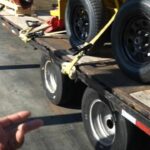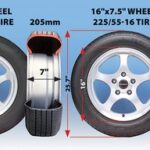The heat generated by trailer tires is a common and often misunderstood issue. While it is true that excessive heat can cause tire failure, the vast majority of cases are caused by other factors. The main reason why trailer tires get hot is due to friction.
When a tire rotates, the tread rubs against the pavement, which causes friction. This friction produces heat, which in turn can lead to tire failure. However, this type of tire failure is relatively rare and usually only occurs after extended periods or when the tires are used excessively.
Trailer tires get hot for a variety of reasons. One reason is that they are constantly being used. When you use your trailer, the tires rotate and create friction.
This friction produces heat, which can build up over time and cause the tires to become hot. Another reason trailer tires may get hot is because of their size. Trailer tires are often larger than regular car or truck tires.
This means that they have more surface area, which means they can absorb more heat from the sun and pavement. Finally, trailers often tow heavy loads behind them. This extra weight puts additional strain on the tires, which can also lead to increased temperatures.
You May Like
- Set of 4 New Premium Radial Trailer Tires 225/75R15 10PR, Brand: FREE COUNTRY
- Full cap ply ( nylon overlay cross entire tread area), significant upgrade from most other…
- Featured “Scuff Guard” ring on tire wall for better tire side protection
- 7 mm deep tread depth vs 5.6 mm of other cheap competitors, has longer mileage life
- Premium FREE COUNTRY Heavy Duty 10 ply rated, load Range E, 2400LBS capacity!
- FULL nylon cap ply overlay cross entire tread area, significant upgrade from most other…
- Featured “Scuff Guard” ring on tire wall for better tire side protection
- This tire is designed for the trailer use only, rims are not included.
- Treadlife: 60,000 miles
- Tire Only
- Season: All Season, Performance: Performance
- Car Type: Truck/SUV
- LONG-LASTING RELIABILITY: Durable 15 inch tires pre-mounted on 15 inch rims, built with…
- HASSLE-FREE SETUP: Pre-assembled trailer tire and rim set ensures quick installation on most…
- PACK OF 2: Convenient 2 pack of trailer tires and trailer wheels delivers efficient…
- VERSATILE PERFORMANCE: Rated up to 50 PSI, each trailer tire offers stable handling and smooth…
- 2 new premium full nylon cap ply 8PR ST205/75R15 Radial trailer tires, brand: FREE COUNTRY
- Full nylon cap ply ( nylon overlay cross entire tread area), significant upgrade from most…
- Featured “Scuff Guard” ring on tire wall for better tire side protection
- 7 mm deep tread depth vs 5.6 mm of other cheap competitors, and longer mileage life
If you notice that your trailer tires are getting hot, there are a few things you can do to help cool them down. One option is to park in the shade or cover the trailer with a tarp when it’s not in use. You can also try inflating the tires slightly more than usual to give them some extra cushioning against the heat.
If you’re regularly having problems with hot trailer tires, it’s best to consult with a mechanic or tire specialist to find out if there’s something else going on that needs to be addressed.
Why Do Trailer Tires Get Hot?
Is It Normal for Trailer Tires to Get Warm?
Yes, it is normal for trailer tires to get warm. This is because trailers are subject to a lot of friction and heat while being towed. The best way to prevent this from happening is to make sure that your trailer tires are properly inflated and that you are not overloading your trailer.
How Hot is Too Hot for a Trailer Tire?
Most trailer tires have a maximum speed rating of 65 miles per hour. The recommended maximum speed for a trailer tire is 55 miles per hour. The load capacity of a tire is reduced as the temperature goes up.
At temperatures above 90 degrees, the load capacity is reduced by 10%. If the temperature gets to 120 degrees, the load capacity is reduced by 25%. That means that if you are hauling a full load on your trailer and the temperature gets to 120 degrees, your tires could be overloaded.
If you are going to be driving in hot weather, it is best to check your tire pressure often and keep an eye on your tires for any signs of heat damage. If you see any bulges or cracks in your tires, replace them immediately. It is also a good idea to keep a spare tire with you in case you have a flat.
How Can I Keep My Trailer Tires Cool?
If you’re noticing that your trailer tires are running hot, there are a few things you can do to help keep them cool.
One thing you can do is check the inflation level of your tires. Overinflated tires can cause increased friction, which in turn creates heat.
Keeping your tires properly inflated will help reduce the amount of heat they generate.
Another thing you can do is make sure you’re not overloading your trailer. An overloaded trailer puts extra strain on the tires, causing them to work harder and generating more heat.
Keep within the weight limits for your trailer to help keep the tires from working too hard.
You can also try to avoid extended periods of travel at high speeds. The faster you go, the more friction is generated, and thus the hotter your tires will get.
If possible, take it easy on the highway and give your tires a chance to cool down periodically.
If you follow these tips, you should be able to keep your trailer tire temperatures down and prevent any potential problems caused by overheating.
What Causes Tires to Overheat?
When driving, several things can cause your tires to overheat. Here are some of the most common causes:
1. Driving too fast – If you’re driving too fast, your tires will have to work harder to keep up with the speed of the car. This can cause them to heat up and eventually overheat.
2. Braking too hard – If you brake too hard, it can cause your tires to skid or slide. This friction creates heat which can lead to tire overheating.
3. Turning too sharply – When you turn sharply, your tires have to grip the road tightly to make the turn. This gripping action can create heat and cause tire overheating.
4. Driving on rough roads – Rough roads can also contribute to tire overheating. The uneven surface puts extra stress on the tires which can lead to increased friction and heat build-up.
5. Poorly inflated tires – Tires that aren’t properly inflated are more likely to overheat than those that are properly inflated.
That’s because underinflated tires flex more as they roll, creating additional friction and heat.
Travel Trailer Tires
Are you planning a cross-country road trip in your travel trailer? If so, you’re going to want to make sure your trailer’s tires are up for the journey. Here’s what you need to know about choosing and maintaining the right tires for your travel trailer:
The first thing to consider is the size of the tire you need. This will be determined by the weight of your trailer, as well as the terrain you’ll be traveling on. For example, if you have a heavy trailer and will be doing mostly highway driving, you’ll want a larger tire that can handle the weight and provide good stability.
On the other hand, if you have a lighter trailer and will be doing more off-road driving, a smaller tire may be better suited for maneuverability. Once you’ve decided on the right size tire, it’s important to choose a quality brand. There are many different brands of RV tires on the market, so do some research to find one that has a good reputation for durability and performance.
You don’t want to end up stranded on the side of the road with a flat tire! It’s also important to properly maintain your RV tires. Check the air pressure regularly (before every trip if possible) and inspect them for any signs of wear or damage.
If you notice any problems, take care of them right away – don’t wait until it’s too late!
Boat Trailer Tires
Boat trailer tires are an important part of towing your boat. They provide the friction and contact needed to keep your boat moving forward while being towed. There are a few things to consider when selecting the right tire for your boat trailer.
The first thing to consider is the size of the tire. Boat trailers come in different sizes and so do tires. You will want to make sure that you select a tire that is the proper size for your trailer.
The second thing to consider is the load rating of the tire. The load rating is how much weight the tire can support safely. You will want to make sure that you select a tire with a high enough load rating for your boat and trailer combined.
The third thing to consider is the tread pattern. The tread pattern on your tires will determine how well they grip the road surface while being towed. You will want to select a tread pattern that provides good traction in both wet and dry conditions.
Finally, you will want to consider the price when selecting boat trailer tires. Tires can range in price from very affordable to quite expensive depending on brand and features.
How to Tell If Trailer Tires are Bad
If you’re like most people, you probably don’t think about your trailer tires until there’s a problem. But just like the tires on your car, trailer tires wear out over time and need to be replaced. So how can you tell if your trailer tires are bad?
Here are some signs that it might be time to replace your trailer tires:
1. The tread is worn down.
The first thing to look for is tread wear.
Just like car tires, trailer tires have treads that wear down over time. If the treads on your trailer tires are severely worn, it’s time to replace them.
2. The sidewalls are cracked or damaged.
Best Trailer Tires
The best trailer tires are those that are designed specifically for trailers. Trailer tires are different from regular passenger or light truck tires in a few important ways. They are constructed to carry heavier loads, and they have a special tread design that helps to keep the trailer stable on the road.
When shopping for trailer tires, it is important to know the weight of your trailer and the type of terrain you’ll be traveling on. This will help you choose the right size and load range for your tires. You should also inspect your trailer’s suspension and axle capacity to make sure that it can handle the weight of the new tires.
Once you’ve selected the perfect set of trailer tires, be sure to follow proper inflation procedures and check the tire pressure regularly. This will help extend the life of your tires and keep your trailer running smoothly down the road.
13 Inch Trailer Tires
If you have a trailer that you tow behind your car, truck, or SUV, then you know how important it is to have the right tires on it. After all, the last thing you want is for your trailer to get a flat tire while you’re driving down the highway. That’s why it’s important to choose the right tires for your trailer – and that includes choosing the right size.
When it comes to trailer tires, there are a few different sizes that are commonly used. One of those sizes is 13-inch trailer tires. These tires are a good option for many trailers, but they’re not necessarily the best option for every single one.
Here’s what you need to know about 13-inch trailer tires before you make a purchase: One of the main things to consider when choosing trailer tires is the weight of your trailer. If your trailer is on the heavier side, then 13-inch tires might not be enough to support it.
If your trailer weighs more than 3,500 pounds, then 14-inch or even 15-inch tires might be a better option. On the other hand, if your trailer isn’t too heavy – say, less than 2,000 pounds – the the13-inchch tires could work just fine. In addition to weight capacity, another thing to keep in mind when choosing trailer tires the s speed rating.
The speed rating tells you how fast the tire can safely go; for example, “S” means up to 112 mph, and “T” means up to 118 mph. If you’ll be doing a lot of highway driving with your loaded-down trailer in tow, then look for tires with a higher speed rating so that you don’t have to worry about them being overworked at high speeds. Finally, take a look at the tread pattern when selecting13 inch tires for your trailer.
Some tread patterns are better suited for off-road use, while other provide area smootheridesde on paved roads. Consider where you’ll mostly be using your trailer, then choose atiredwitha tread pattern that matches those conditions. Ultimately, there is no ” perfect” size for trailer the tire ; it depends on the weight and intended use of your particular trailer.
However,13 inchtiresareagreat optionfortrailerson themore lightweight side and they canworkwellfor bothon-roadandoff-road uses. Just make sure to check the other specs before making your a final decision.
Conclusion
When towing a trailer, the tires can get hot from the friction of the road. This is normal and nothing to worry about as long as you keep an eye on them. If they start to smoke or smell, then pull over and let them cool down.














